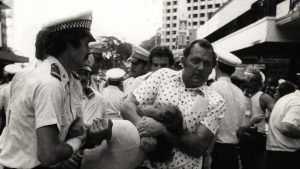On September 8, 1967, 4000 students marched from University of Queensland’s St. Lucia campus to the centre of Brisbane, to protest for rights to free speech and public protesting. Upon being obstructed by police, the students staged a mass sit-down protest in Roma Street.
By the end of the day, over 120 student protestors had been arrested, while many others were left bruised and bloodied. It was one of the most violent clashes the state had seen, and one which marked the beginning of a new era for student politics.
To commemorate the 50th anniversary of the historic Civil Liberties March of 1967, The Civil Liberties ’67 Reunion Committee brought together a number of speakers and guests at University of Queensland’s Emmanuel College on Saturday, September 9.
The full-day conference saw over 16 guest speakers participate in a series of seminars which focused on the sociopolitical landscape of the 1960’s, the emergence of civil rights movements during the 1960’s and 70’s, and the effect of the mass political movements of the 1960’s on contemporary forms of activism.
Notable speakers included co-founder of the Australian Greens Drew Hutton, leading Aboriginal activist Adrian Burragubba, former political activist Dan O’Neill, Post-Doctoral Development Fellow at UQ John Piccinni, frequent Green’s candidate and author Jim Prentice, and Greens Councillor Jonathon Sri.
Committee member and scholar at Griffith University Debra Beattie, said an anniversary event helps us to reflect on the social and political context of the 1967 Civil Liberties March and how the movement prompted further civil rights action.
“It had a big impact on the progression of social values. I was a student at UQ in the 1970’s, and some of the speakers here today definitely frame my understanding of what was politically important,” Ms Beattie said.
According to Beattie, the march of 1967 and the succeeding movements reiterate the importance of liberal values and passing on positive values.
“One of the reasons for organising the 50th anniversary was that it’s important to make connections with young people, especially in terms of how the movement holds a contemporary relevance.”
“There’s a thin red line going from way back then, to now, and we’re all much better off if we’re in understanding of each other and our political history.
“The march reminds us of the importance of listening to one an other, compassion, and giving what you can, and taking only what you need. These values are important for a functional democracy.”
An inspiring celebration
The full day program began with an inspiring Welcome to Country by Bob Anderson, followed by a moving acknowledgement speech by Peter Wertheim. Speakers then took turns in delivering a short speech relating to the session’s topic.
Dan O’Neill, Di Zetlin and John Piccini kicked off session 1, as they explored the ‘social and political context of the 1967 Civil Liberties March’ and detailed how the movement led to a strengthened opposition to Australia’s involvement in Vietnam and conscription.
Each speaker reflected on the progress of gender equality and women’s reproductive rights, the issues of national colonialism and possession during the 1960’s and the global circulation of ideas and movements.
“Because we were all struggling against the war and other issues, no one could be sectioned off. It’s like everyone’s eyes were being opened to everything that was going on in the world,” said political activist Di Zetlin, as she reflected on the restriction of civil rights in the 1960’s.
“For women especially, we were pretty ignorant about a lot of these issues for a long time; we just accepted things for the way they were. But it was a time of hope, and political consciousness was deep in our generation.”

Image: The University of Queensland
Session 2 then saw speakers Jim Prentice, Peter Wertheim, Bob Carnegie, Jennie Harvie, Anne Richard and Cheryl Buchanan participate in a panelled discussion themed ‘Taking Stock.’
Together, they covered the advent of globalisation, the importance of solidarity and identity in the quest for social cohesion, the trade union movement in a post-war era, radical ideas and movements as an approach to social change, and the issues affecting Aboriginal communities.
A final afternoon discussion then gave Drew Hutton, Prof Ian Lowe, Adrian Skerritt, Cameron Murray, Adrian Burragubba and Ellen Roberts the opportunity to explore contemporary forms of activism and current existential issues through the lens of historical rights movements.
Each speaker offered valuable insights into Queensland’s civil rights history, as they centred on the various movements that exposed and challenged the authoritarian politics of the 1960’s and 1970’s, and discussed how the Civil Liberties movement ushered in a new era of student and state politics.
The Civil Liberties Committee is made up of people who took part in the Civil Liberties March of ’67, in addition to others who were influenced by the political movements that arose after this event.
The event took place at UQ’s Emmanuel College on Saturday, 9 September.



